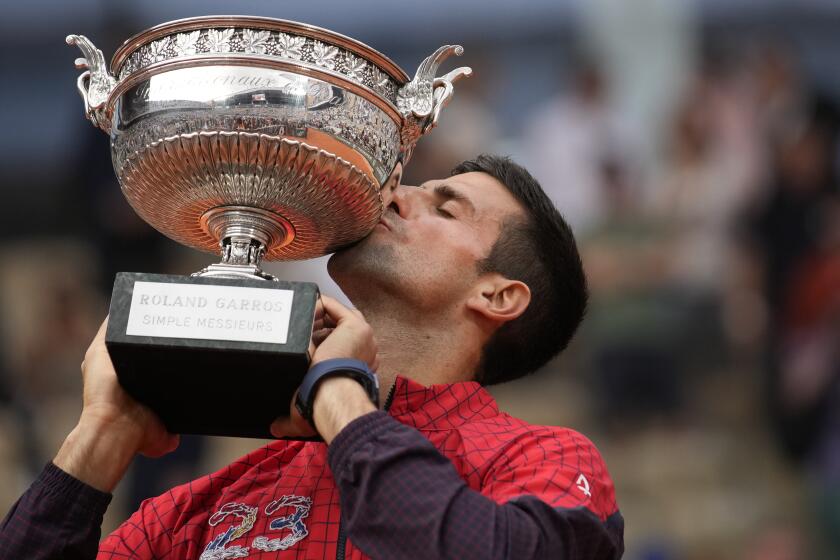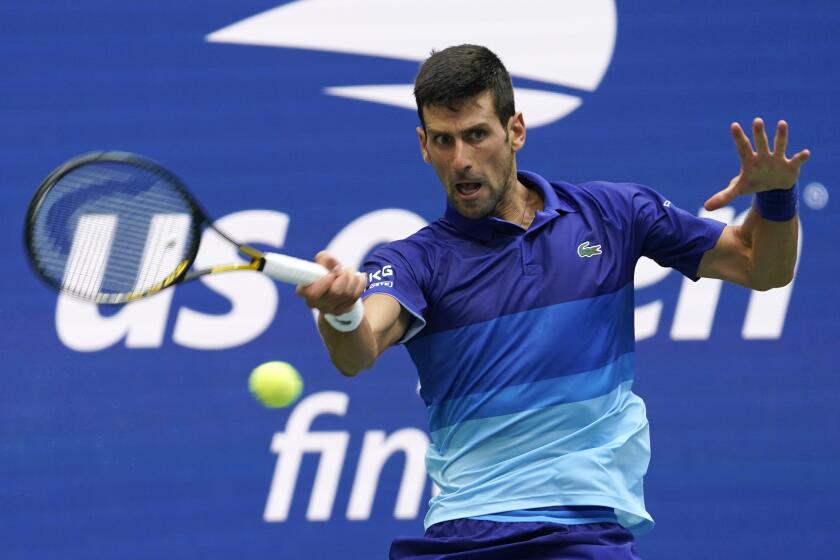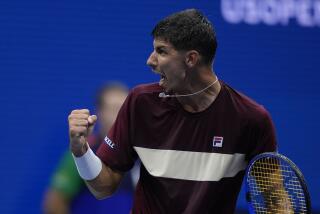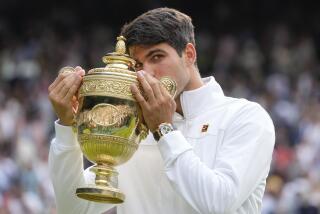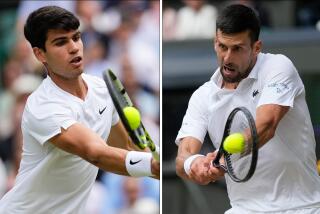Column: Why Wimbledon favorite Novak Djokovic can win anything but tennis fans’ love
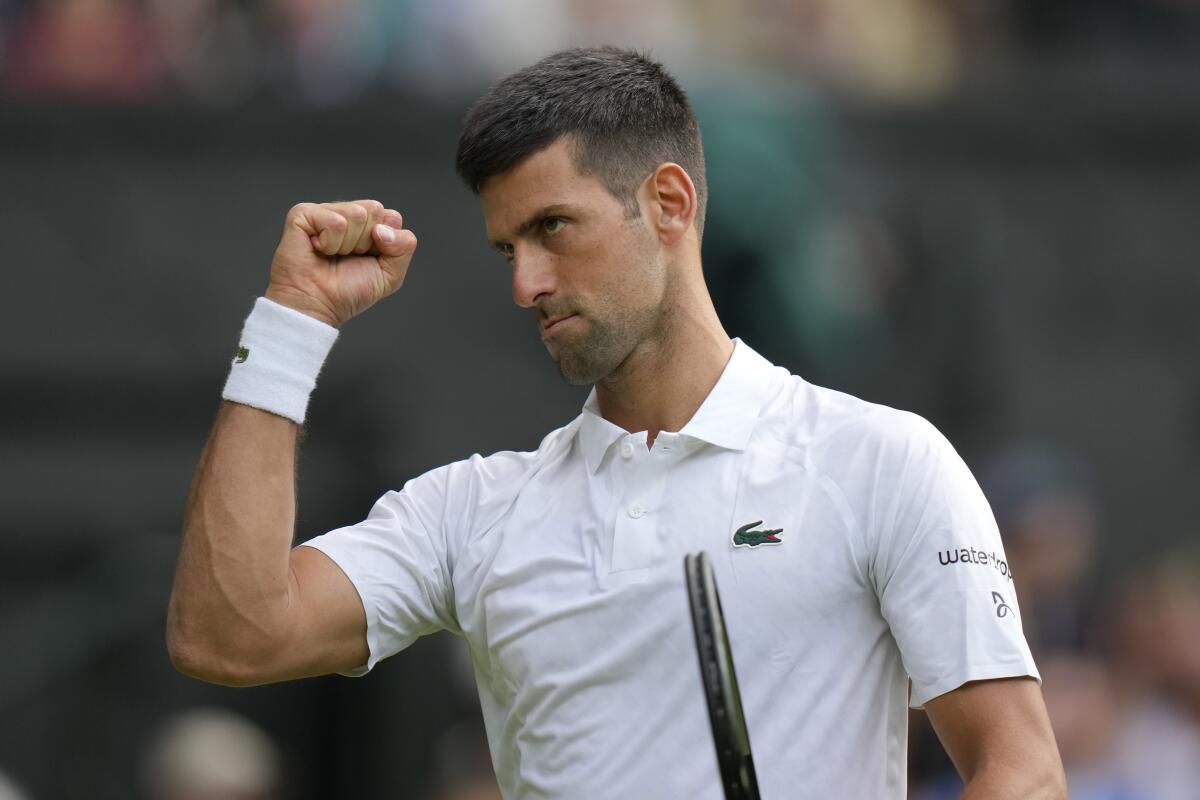
One of the most memorable sporting events I ever attended was the 2012 men’s Wimbledon final, which pitted the Swiss great Roger Federer against Britain’s own Andy Murray. A Brit hadn’t won Wimbledon since Fred Perry in 1936: That’s 76 years of national disappointment and heartbreak.
What made the match unique, however, wasn’t just the prospect of history being made but also the palpable conflict within the Centre Court crowd. As much as they wanted Murray to end their national suffering, they didn’t want the beloved Federer to suffer in the process.
Opinion Columnist
LZ Granderson
LZ Granderson writes about culture, politics, sports and navigating life in America.
My hope is that Novak Djokovic one day achieves the level of adoration Federer enjoys. But it’s not looking good.
With Wednesday’s straight-sets victory over Jordan Thompson, the Serb moved closer to capturing his eighth Wimbledon title, tying Federer’s record, and 24th major overall, tying a record set by Margaret Court. Djokovic is the only player to have beaten both Federer and Spain’s Rafael Nadal at all four majors. When he retires, he will likely own every tennis statistic of importance.
And yet the 36-year old is still trying to figure out how to win the one thing he probably wants most: the kind of love that causes a home crowd to root for the visitor despite themselves — the kind that would make being the greatest feel good.
Novak Djokovic won his men’s-record 23rd Grand Slam title by beating Casper Ruud in straight sets at the French Open final on Sunday.
At first, the men’s tennis crown rested uneasily on Djokovic’s head because of who he wasn’t. Then his handling of the pandemic shone an unflattering light on who he was.
During the early days of COVID-19, in 2020, Djokovic launched an ill-fated exhibition tour that felt like a millionaire’s temper tantrum. Upset about canceled tournaments, the then-world No. 1 used his platform essentially to organize a super-spreader event: capacity crowds in the stands, lots of hugging among players, no social distancing by anyone.
Predictably, Djokovic soon tested positive for the virus, as did his wife. So did other players who participated, including Viktor Troicki and his then-pregnant wife. It was incredibly selfish, and his fellow players said as much on social media.
“Prayers up to all the players that have contracted Covid-19,” tweeted Nick Kyrgios, who was not a big Djokovic fan to begin with. Kyrgios added that while he might have been accused of being irresponsible or stupid, “this takes the cake.”
Competing in the Olympics in Tokyo the following year, Djokovic threw his racket after losing the singles match for the bronze medal. He then withdrew from a mixed-doubles match citing injury, but his meltdown had invited suspicion about his true reasons.
Last year, after being denied entry into Australia for not being vaccinated against COVID, Djokovic found himself at the center of an international circus. He tried to position himself as a victim of political correctness but later admitted he had lied on his travel documents — again for his own selfish ends.
Serbia’s Novak Djokovic has withdrawn from the U.S. Open. He is not allowed to enter the U.S. because he is not vaccinated against COVID-19.
Djokovic can be generous, approachable and funny. Yet he remains frustratingly petulant and tone-deaf in ways we don’t expect from athletes at his level.
It’s not unusual for an era in sports to be shaped by a bad boy or two. Such athletes may even briefly reign at the top of a game.
But bad boys aren’t usually in the “greatest of all time” conversation. That’s because reaching that level requires talented bad boys to become battle-tested men.
The business of professional sports also requires star athletes to be attractive to as many fans as possible. During his anti-vax drama in Australia, Djokovic lost sponsors as well as the benefit of the doubt.
Djokovic’s desire to be the game’s ambassador is at odds with his need to be its chief antagonist. He splits the difference, which doesn’t satisfy anyone.
I want to feel good about this era of tennis, and with Federer and Nadal as its faces, I did. Djokovic has proved to be the best of them all, however, and as a result, this time belongs to him — on the court, anyway.
It’s not that Djokovic doesn’t have fans; of course he does. But when Murray finally ended Britain’s drought at Djokovic’s expense in 2013, I sensed none of the conflicted sympathies in the crowd that Murray’s loss to Federer had generated the year before.
That turned out to be the last time Djokovic lost at Centre Court — but not the last time the Wimbledon crowd openly cheered for his opponent, usually Federer.
My hope is that Djokovic will find his way into more hearts and be celebrated the way a champion like him should be. But it’s not looking good.
More to Read
A cure for the common opinion
Get thought-provoking perspectives with our weekly newsletter.
You may occasionally receive promotional content from the Los Angeles Times.

